The words "processed food" are enough to strike fear into the hearts of many health-conscious consumers. In the last decade or so, we've all been taught to fear the dangers of eating foods that undergo a serious transformation from their original form (if they even had an original form—as far as we know, there's no such thing as a protein bar farm or an energy drink river).
Still, it's possible that the pendulum has swung too far when it comes to attitudes about processed foods. In recent years, many experts have begun encouraging people not to demonize them all in one fell swoop. The fact is, many (if not most) very healthy foods have to go through some sort of process before they reach grocery store shelves. Unless you live on a self-sustaining farm, you'll likely need to eat processed foods as part of your regular diet.
The thing to remember is that there's a difference between processed and ultra-processed foods. Whereas processed food is simply one that has gone through some form of change between farm and table, ultra-processed foods are those that have been dramatically altered with the addition of artificial flavors and colors, extra sweeteners, preservatives, hydrogenated fats, and other questionable ingredients. It's these foods that have been primarily associated with adverse health outcomes like obesity and heart disease.
We're cutting through the confusion around processed foods by identifying 10 foods that, though technically processed, are actually good for you.
Healthy Processed Foods:
- Whole Wheat Bread
- Canned or Frozen Lentils
- Yogurt
- Dried Fruit
- Frozen Whole Grain Waffles
- Popcorn
- Hummus
- Soy Milk
- Canned Fish
- Bean-Based Pasta
Whole Wheat Bread
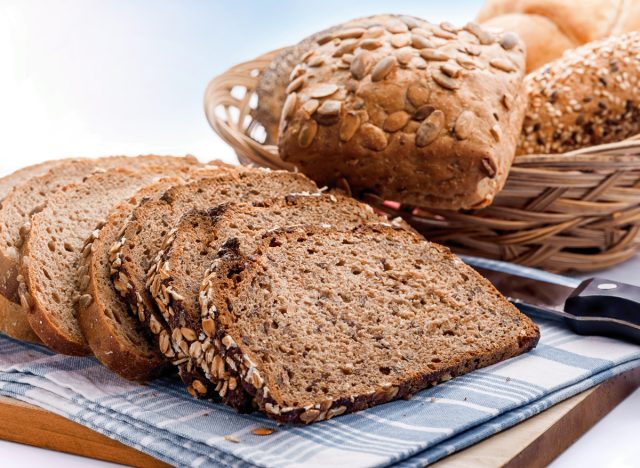
All bread is technically processed—no one's pulling whole loaves straight off a bread tree. But that doesn't mean you should avoid all bread. When you choose a variety made with whole wheat as the first ingredient, you'll reap the benefits of fiber, micronutrients, and a bit of protein.
Haley Bishoff, RDN, owner of Rūtsu Nutrition in Las Vegas, recommends Dave's Killer Bread as a processed yet healthy choice. "Many of Dave's breadsare packed full of fiber, omega-3 fatty acids, and even a few grams of protein per slice. Bread can get a bad rap, but nutritious, whole grain options like this can be considered a healthy diet staple."
Canned or Frozen Lentils
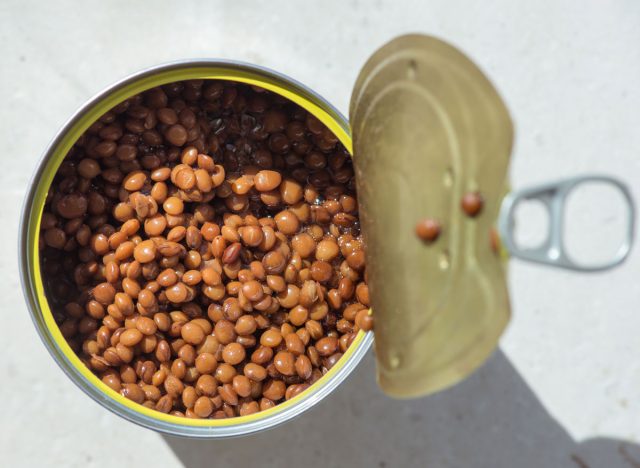
Plant-based protein is all the rage these days, and it's easy to see why. Plant foods like lentils not only offer plenty of protein but also stock you up on fiber, folate, magnesium, manganese, and other important nutrients. Fortunately, you don't have to do the work of soaking and boiling them to enjoy their excellent nutrition. Canned or frozen lentils do just as well for your health as dried ones.
Need a suggestion to start in on easy lentil stews and curries? Try Trader Joe's microwaveable steamed lentils. "These lentils are a versatile plant-based protein that can be enjoyed hot or cold," says Catherine Karnatz, MPH, RD, creator of Nutrition Education RD. "At 6 grams of fiber, 10 grams of protein, and 21 grams of complex carbohydrates per ½ cup serving, this little legume makes the perfect addition to soups and salads to promote regular digestion, stable blood sugar levels, and ample energy."
Yogurt
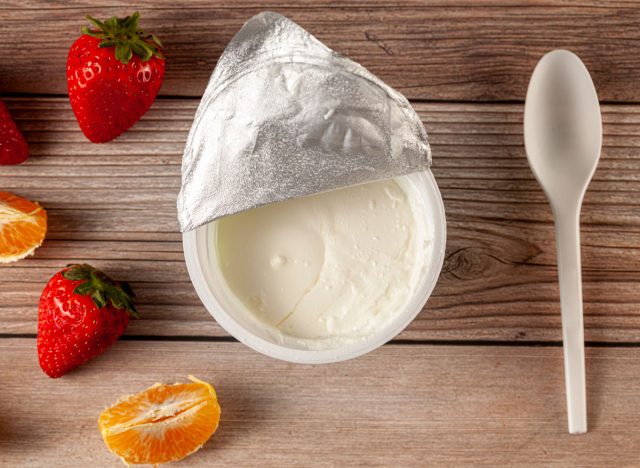
"Most people wouldn't think of yogurt as a processed food, but it is!" says Steph Magill, MS, RD, CD, FAND, of Soccer Mom Nutrition. The process of turning cow's milk into a thick, creamy dairy treat takes time, temperature, and added bacterial cultures. The good news is that these multiple steps don't detract from yogurt's healthfulness. Magill points out that yogurt is a good source of protein, calcium, vitamin B1, and probiotics that can support your digestive and immune health.
To choose the healthiest, least processed yogurt, opt for plain or lower-sugar versions.
"Look for plain yogurt with less than 12 grams of sugar per serving and add your own fresh fruits or nuts for flavor and sweetness," Magill suggests.
Dried Fruit
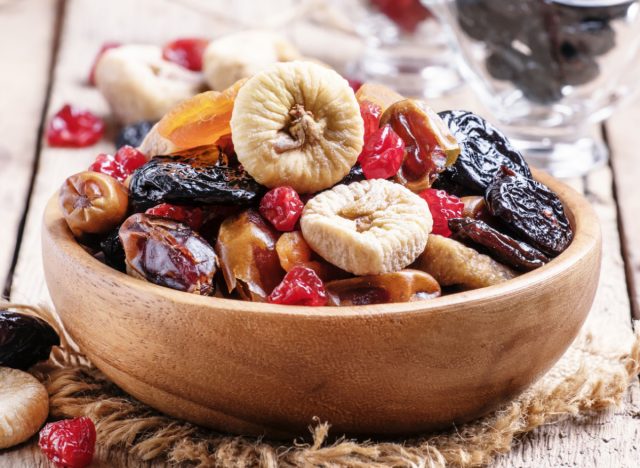
They come in a package and are sold next to candy bars—does that mean dried fruits are too processed to be healthy? Nope! Though they may not have the water content of fresh apples or berries, dried fruits have just as many nutrients. In fact, they sometimes contain more fiber and antioxidants than fresh fruits, since there are more of them per serving.
"Raisins are an excellent energy-boosting snack to keep in your bag," says Katie Schimmelpfennig, RD, founder of Eat Swim Win. "They are packed with fiber, iron, and carbohydrates to fuel both your brain and muscles." Or, to snack on dried fruit in a convenient bar, try something like That's It! bars. Made entirely with dried fruit—nothing else—they're the equivalent of eating a whole apple, whole mango, and/or whole pear.
Frozen Whole Grain Waffles
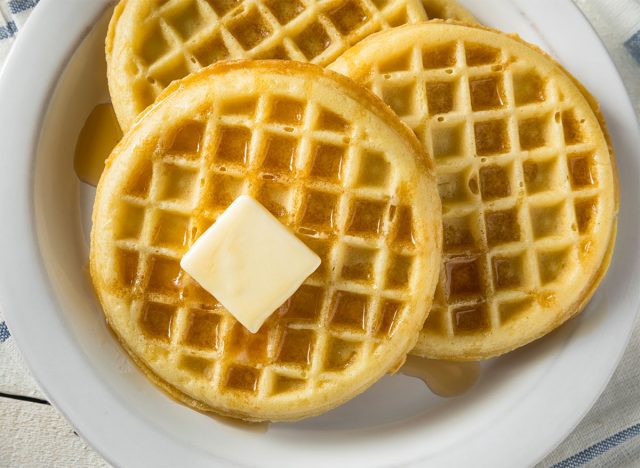
Frozen waffles made with refined flour might not be the greatest choice for breakfast, but whole-grain frozen waffles can start your morning right. "These are a nutritious processed food option because they provide complex carbohydrates and fiber, promoting sustained energy and a healthy digestive system," says Jessi Holden, MS, RDN, of The Kitchen Invitation. "They are convenient, versatile, and easy to make, and pair well with a layer of nut butter and fruit on top."
Popcorn

Buttery microwave popcorn is often a source of hidden trans fats and artificial flavors, putting it squarely in ultra-processed territory. But plain or lightly salted popcorn is far less processed—and actually has quite a few health benefits.
"Popcorn is a delicious, nutritious, and quick snack to keep on hand. It is loaded with fiber and magnesium and only 100 calories for 3 cups," says Chris Henigan, MS, RD, LDN, of Simple Start Nutrition. "I buy plain kernels and pop them myself. I can add any flavor I'm in the mood for, like chili lime, parmesan cheese, or cinnamon sugar if I'm feeling sweet."
Hummus
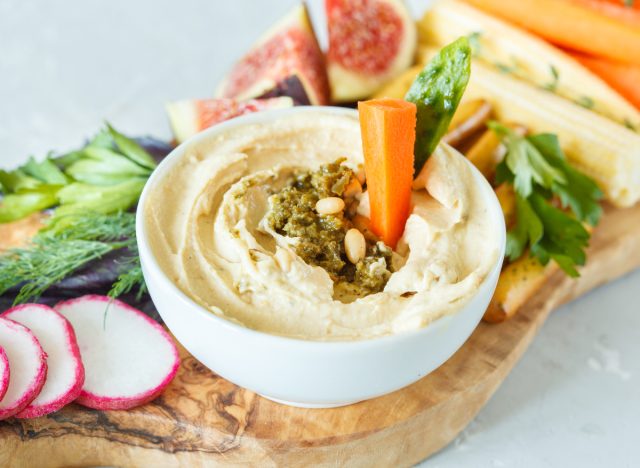
Hummus may be processed, but it's still a simple, nutritious food. "Hummus is made primarily of garbanzo beans and olive oil, making it a heart-healthy snack with fiber and protein," says Henigan. Pair it with veggies like pepper strips or carrot sticks and you've got a great compromise between whole and minimally processed snacking.
Soy Milk
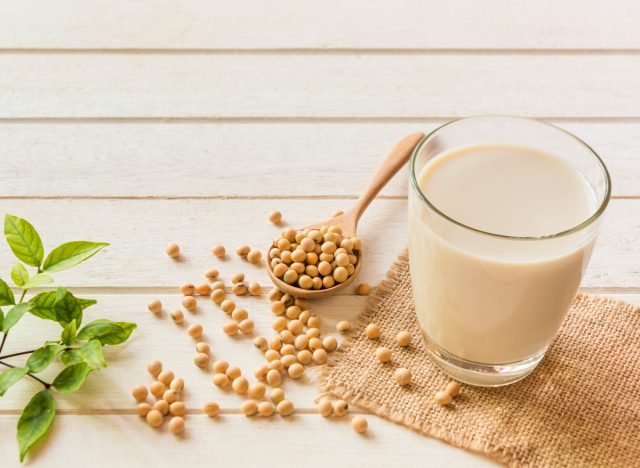
When it comes to plant-based, non-dairy milks, there's quite a spectrum of processing. Some have ingredient lists as long as your arm, complete with emulsifiers, fillers, and preservatives. Others are far simpler—and simple is a good sign.
"For vegans or people with lactose intolerance, I suggest soy milk," says Cheryl Mussatto MS, RD, LS, a clinical dietitian and author of The Nourished Brain. "It is the only plant-based milk that has complete protein and offers all of the essential amino acids of cow's milk and is fortified with calcium and vitamin D." Pacific Foods' organic unsweetened soy beverage, for example, contains just water and organic soybeans.
Canned Fish
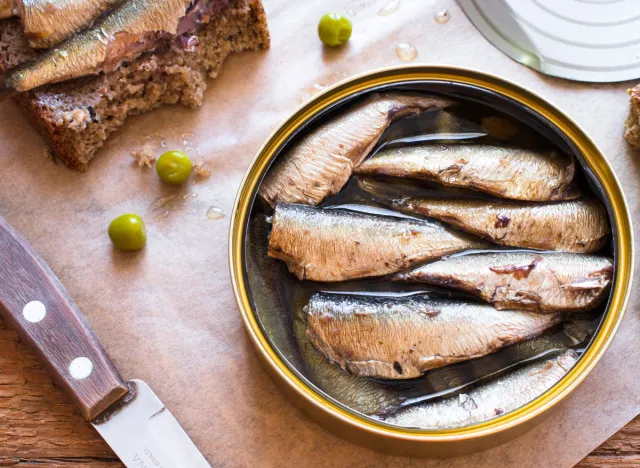
To get your daily dose of healthy fats (not to mention protein), don't discount canned fish. It may be more processed than a fillet of salmon or fresh-caught trout, but fish in a can still offers excellent nutrition—and usually costs less than the fresh variety.
"Canned fish such as canned tuna or salmon is a good go-to for an easy meal," says Brittany Crump, MPH, RD, LD, CDCES, owner of Savor Nutrition. "Fish is an excellent source of omega-3s, which help support heart health and brain function."
Bean-Based Pasta
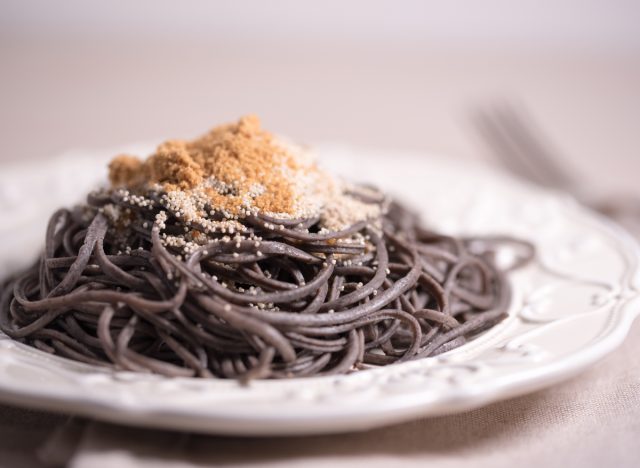
"As a pediatric dietitian and mom of three, one of my favorite ways to help my kids meet their needs for protein and fiber is to use bean- and legume-based pasta," says dietitian and author Malina Malkani, MS, RDN, CDN.
Her favorite option is Barilla's chickpea penne pasta. "It may be processed, but it's a nutritious alternative to traditional pasta for anyone interested in increasing the nutrient density of their meals and building sustainable, plant-based proteins into their diets." This bean-based penne provides 15% of the Daily Value for iron, 12 grams of protein, and 8 grams of fiber per serving.
No comments:
Post a Comment